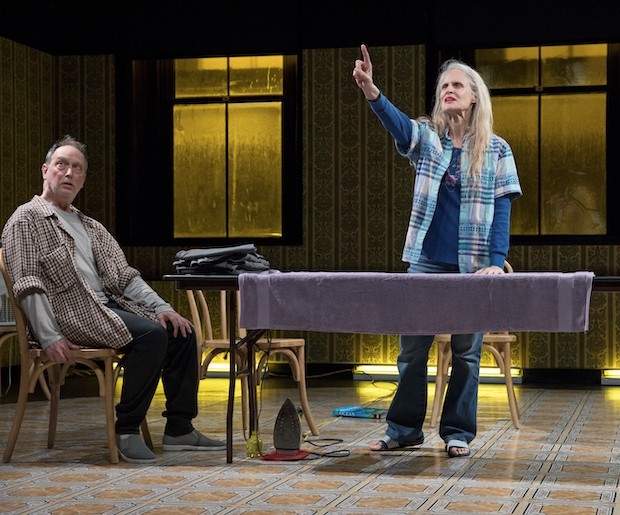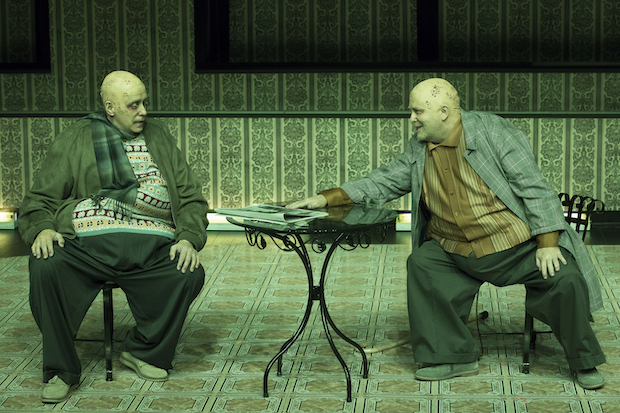Review: In Mud/Drowning, Dreamers Reach for the Unobtainable
Mabou Mines stages two short plays by María Irene Fornés, with music by Philip Glass.

(© Julieta Cervantes)
"We are all in the gutter, but some of us are looking at the stars," says Lord Darlington in Oscar Wilde's Lady Windermere's Fan. This aphorism certainly applies to the protagonists of Mud/Drowning, a pair of one-act plays by the late playwright María Irene Fornés, now appearing under the banner of Mabou Mines at 122CC. With devastating precision, Fornés dramatizes the feeling of reaching for a shooting star that seems tantalizingly close, only to be pulled back down into the muck.
This terse distillation of life has somewhat played out in the show's own production history: Mud/Drowning ran briefly in early 2020, closing a week before the Covid pandemic ended live theater for over a year. It was set to return to the Public Theater's Under the Radar Festival earlier this year, but that too was foiled by Covid. Now audiences can experience this heartbreaking double-feature, which JoAnne Akalaitis has directed with meticulous economy.
First up is Mud, which tells the story of Mae (Wendy vanden Heuvel), a woman living in desperate poverty with her "mate" Lloyd (Paul Lazar). But Mae has an escape plan: "When I finish school I'm leaving. You hear that? You can stay in the mud," she tells Lloyd. While she initially suspects that the addition of Henry (Tony Torn) to her life will further her goals, she ends up with two adult male dependents, instead of just one. "Everything turns bad for me," she observes in the most superfluous line of this brutally succinct script.
Akalaitis matches the writing style with a staging that exists halfway between table read and full production, eschewing frills for the bare essentials. Sifiso Mabena recites stage directions from a stage left chair, subtly judging the proceedings with every crinkled nose and dragged vowel. Lazar embodies a foul character (he reveals to Mae that he fornicates with pigs) through childish demands and rageful screeches, yet he miraculously manages to make us feel some sympathy for Lloyd through his howls, which conjure an animal in agony. Deploying perfect comic timing, Torn is hilarious and pathetic as Henry. Vanden Heuvel simultaneously conveys exhaustion and endurance as Mae, wielding a hot iron like a weapon as she presses trousers on a makeshift ironing board. We get the sense that she is enacting a timeless story of ambitious women thwarted by the impulse to provide care.

(© Julieta Cervantes)
This first part is immediately followed by Drowning, a six-page play that composer Philip Glass has turned into a "pocket opera" (Glass also provides incidental music for Mud). Music director Michael Ferrara (on keys) and harpist Anna Bikales pluck out Glass's trademark ostinati, which sound especially haunting on harp. Downstage, two rotund men, Pea (Gregory Purnhagen) and Roe (Peter Stewart), meet at an outdoor café, where Pea falls in love with a woman photographed in Roe's newspaper. His unfamiliarity with the concept of a newspaper and the clusters of barnacles growing on his skin (incredible makeup design by Gabrielle Vincent) suggests that Pea is some sort of sea creature, perpetually amazed by life out of his waters. He is like Ariel from The Little Mermaid, but ugly.
And don't ugly sea monsters deserve love too? Purnhagen powerfully makes the case through a warm tenor that exudes a gentle longing. Stewart and Tomas Cruz (who plays a mysterious third character named Stephen) both seem older and colder — wise to the realities of the world and the potential for asphyxiation above the surface. This shortest of operas ends an already depressing evening on a painfully beautiful note of sadness.
Both plays take place on Kaye Voyce's versatile set, the cheap tiles and busy wallpaper evoking both Mae's shanty and the surreal café in Drowning. Voyce's costumes for Mud give us a sense of the character (Henry's ugly mismatched suit) while also seeming as though they might have been worn by the actors on the way to the theater. No such plausible deniability exists for Voyce's costumes for Drowning, which must fit over the bloated body suits the actors wear (practically a product placement for DXL). Yellow tube lights along the floor are the most noticeable feature of Thomas Dunn's lighting design: They bathe the stage in a jaundiced glow while also seeming to slow down time, giving us a moment to contemplate the layers in these deceptively straightforward plays.
Mud/Drowning is a perfect tribute to Fornés, a writer of striking originality whose plays still seem to contain galaxies undiscovered.









